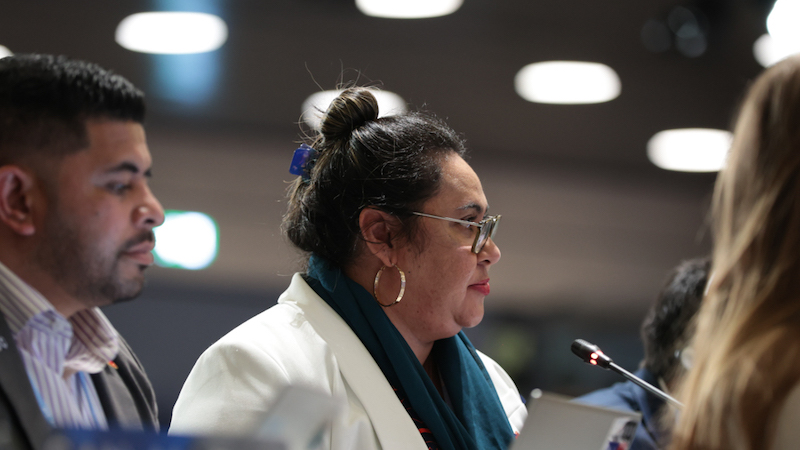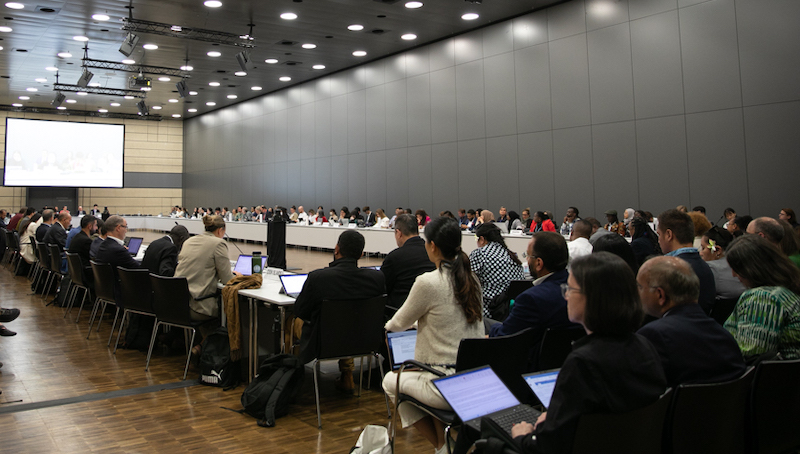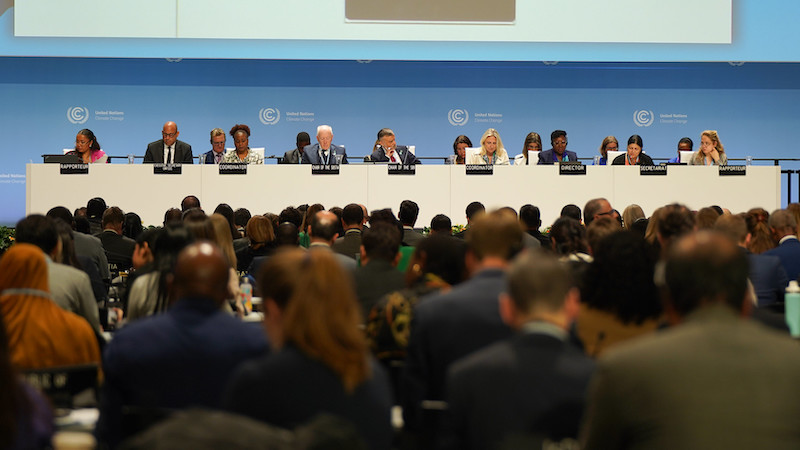UN climate talks in Bonn ended in finger-pointing over their failure to move forward on a key programme to reduce planet-heating emissions, with the UN climate chief warning of “a very steep mountain to climb to achieve ambitious outcomes” at COP29 in Baku.
In the closing session of the two-week talks on Thursday evening, many countries expressed their disappointment and frustration at the lack of any outcome on the Mitigation Ambition and Implementation Work Programme (MWP), noting the urgency of stepping up efforts to curb greenhouse gas pollution this decade.
The co-chairs of the talks said those discussions had not reached any conclusion and would need to resume at the annual climate summit in Azerbaijan in November, unleashing a stream of disgruntled interventions from both developed and developing countries.
Samoa’s lead negotiator Anne Rasmussen, speaking on behalf of the Alliance of Small Island States (AOSIS), emphasised that “we really can’t afford these failures”. “We have failed to show the world that we are responding with the purpose and urgency required to limit warming to 1.5 degrees,” she said.

Anne Rasmussen of Samoa, speaking on behalf of the Alliance of Small Island States (AOSIS). Photo: IISD/ENB – Kiara Worth
Governments, from Latin America to Africa and Europe, lamented the lack of progress on the MWP because of its central role in keeping warming to the 1.5C temperature ceiling enshrined in the Paris Agreement.
Current policies to cut emissions are forecast to lead to warming of 2.7C, even as the world is already struggling with worsening floods, droughts, heatwaves and rising sea levels at global average temperatures around 1.3C higher than pre-industrial times.
Mitigation a taboo topic?
Despite the clear need to act fast, a deep sense of mistrust seeped into talks on the MWP in Bonn, with negotiators disagreeing fundamentally over its direction, according to sources in the room.
Developed countries and some developing ones said that the Like-Minded Group of Developing Countries (LMDCs), led primarily by Saudi Arabia and China, as well as some members of the African Group, had refused to engage constructively in the discussions.
“The reason is that they fear this would put pressure on them to keep moving away from fossil fuels,” an EU delegate told Climate Home.
Bolivia’s Diego Pacheco, speaking on behalf of the LMDCs, rejected that view in the final plenary session, while describing the atmosphere in the MWP talks as “strange and shocking”. He also accused developed countries of trying to bury data showing their emissions will rise rather than fall over the course of this decade.
The EU and Switzerland said it was incomprehensible that a body charged with cutting greenhouse gas emissions had not even been allowed to discuss them.
“Mitigation must not be taboo as a topic,” said Switzerland’s negotiator, adding that otherwise the outcome and credibility of the COP29 summit would be at risk.
Rows over process
Before MWP negotiations broke down in Bonn, its co-facilitators – Kay Harrison of New Zealand and Carlos Fuller of Belize – had made a last-ditch attempt to rescue some semblance of progress.
They produced draft conclusions calling for new inputs ahead of COP29 and an informal note summarising the diverging views aired during the fraught exchanges. For many delegates, the adoption of those documents would have provided a springboard for more meaningful discussions in Baku.
But the LMDC and Arab groups refused to consider this, arguing that the co-facilitators had no mandate to produce them and calling their legitimacy into question – a claim rebutted by the UN climate secretariat, according to observers. Frantic efforts to find common ground ultimately came to nothing.
Fernanda de Carvalho, climate and energy policy head for green group WWF, said the MWP discussions must advance if the world is to collectively reduce emissions by 43% by 2030 and 60% by 2035 from 2019 levels, as scientists say is needed.
The MWP should be focused on supporting countries to deliver stronger national climate action plans (NDCs) – due by early next year – that set targets through to 2035, she said.
“Instead, we saw [government] Parties diverging way more than converging on hard discussions that never made it beyond process,” she added.
‘Collective amnesia’
Some developing countries, including the Africa Group, pushed back against what they saw as efforts by rich nations to force them to make bigger cuts in emissions while ducking their own responsibilities to move first and provide more finance to help poorer countries adopt clean energy.
Brazil – which will host the COP30 summit in 2025 – said the MWP was the main channel for the talks to be able to find solutions to put into practice the agreement struck at COP28 to transition away from fossil fuels in energy systems in a fair way.
But to enable that, “we have to create a safe environment of trust that will leverage it as a cooperative laboratory”, he said, instead of the “courthouse” it has become “where we accuse and judge each other”.
Observers in Bonn pointed to the absence of discussions on implementing the COP28 deal on fossil fuels, which was hailed last December as “historic”.
“It seems like we have collective amnesia,” veteran watcher Alden Meyer, a senior associate at think-tank E3G, told journalists. “We’ve forgotten that we made that agreement. It’s taboo to talk about it in these halls.”
‘Detour on the road to Baku’
After the exchange of views, UN Climate Change executive secretary Simon Stiell noted that the Bonn talks had taken “modest steps forward” on issues like the global goal on adaptation, increased transparency of climate action and fixing the rules for a new global carbon market.
“But we took a detour on the road to Baku. Too many issues were left unresolved. Too many items are still on the table,” he added.
Another key area where the talks failed to make much progress was on producing clear options for ministers to negotiate a new post-2025 climate finance goal, as developed countries refused to discuss dollar amounts as demanded by the Africa and Arab groups, among others.
Bonn talks on climate finance goal end in stalemate on numbers
Developing nations also complained about this in the final session, while others expressed their concern that a separate track of the negotiations on scientific research had failed to address the topic in a rigorous enough manner.
In his closing speech, Stiell reminded countries that “we must uphold the science”, and urged them to accelerate their efforts to find common ground on key issues well ahead of COP29.
The next opportunities to move forward on the new finance goal – expected as the main outcome from the Baku summit – will be a “retreat” of heads of delegations in July followed by a technical meeting in October, including a high-level ministerial dialogue on the issue.
But several observers told Climate Home that highly contentious issues – such as the size of the funding pot and the list of donors – are beyond the remit of negotiators and are unlikely to be resolved until the political heavyweights, including ministers, take them up in Azerbaijan in November.
Rising costs of climate crisis
“Business-as-usual is a recipe for failure, on climate finance, and on many other fronts, in humanity’s climate fight,” Stiell said. “We can’t keep pushing this year’s issues off into the next year. The costs of the climate crisis – for every nation’s people and economy – are only getting worse.”
Mohamed Adow, director of Kenya-based energy and climate think-tank Power Shift Africa, warned that “multiple factors are setting us up for a terrible shock at COP29″, saying this “ticking disaster threatens to undermine” the NDCs and in turn the 1.5C warming limit.
North Africa’s disappearing nomads: Why my community needs climate finance
In comments posted on X, formerly Twitter, Adow called for justice for those dying from the impacts of climate change such as extreme heat in India and Sudan in recent days, arguing that climate finance remains “a vital part in securing a safe and secure future for us all”.
But, he said, Bonn did not deliver a beacon of hope for vulnerable people. “Developing countries are expected to slay the climate dragon with invisible swords, having gotten zero assurances on the long-term finance they need,” he added.
(Reporting by Megan Rowling and Matteo Civillini, editing by Joe Lo)
The post UN climate chief warns of “steep mountain to climb” for COP29 after Bonn blame-game appeared first on Climate Home News.


